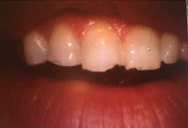
Besides stress, bruxism can negatively impact the body in many ways. It may also result from bite problems, the overuse of stimulating substances (caffeine, alcohol, tobacco, and illegal drugs), and as a side effect of certain medications.
Sometimes, simply becoming aware of the habit can help. Stress reduction techniques which include exercise or meditation are an option while a dental professional monitors the situation to see if there is improvement.
Clenching and Grinding Teeth is Called Bruxism
The most common issue that occurs from clenching and grinding is a headache. Although bruxism is a habit that affects many people, many are unaware they are suffering from it, especially since it most often only occurs at night. Grinding forces wear down the enamel, cause chipping or damage to teeth or dental work (such as veneers or fillings), or even loosen a tooth! While it’s common in children under 11 years old who are losing and erupting permanent teeth causing the bit to change creating premature wear and tear, in adults it can be a cause for concern.
Other commons signs of clenching and grinding besides damage to teeth are mouth pain or teeth soreness. A dental professional will also notice evidence of bruxism during an exam or cleaning: sensitivity and apparent wear and tear on the chewing surfaces is a signal it’s time to do something.
How to Fix the Problem
When clenching or grinding teeth is caused by a minor bite problem an adjustment of tooth surfaces or “equilibration” can remedy the situation. This involves removing a tiny bit of enamel from an individual tooth that is out of position, bringing it into better alignment with the others. If it’s a more serious bite issue, consulting with orthodontic specialists like those at Greater Houston Orthodontics, who are trained to prevent, diagnose and treat facial and dental irregularities, such as malocclusions (bad bites) is highly recommended.
When damage to teeth is severe enough to require dental work, a custom-made night guard (occlusal guard), may be required also at bedtime after the damaged tooth corrected. This type of appliance prevents your teeth contacting each other while you sleep to prevent additional wear and tear of enamel, fracturing of teeth, and protects your jaw joints from stresses due to excessive grinding forces that are the common cause of headaches.
If you would like more information about this bruxism and the different options available to treat the problem by an orthodontic specialist, contact our Memorial or West University office to schedule a complimentary evaluation on how to best resolve your individual problem.